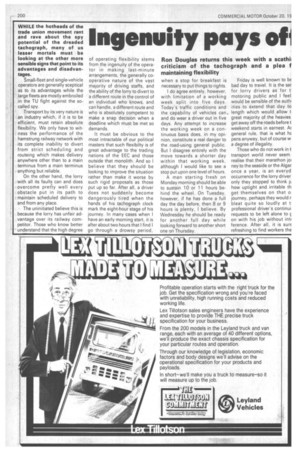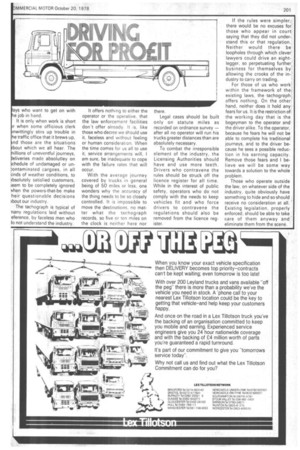Ingenuity pays al
Page 202

Page 203

If you've noticed an error in this article please click here to report it so we can fix it.
Ron Douglas returns this week with a scathil criticism of the tachograph and a plea f maintaining flexibility
WHILE the hotheads of the trade union movement rant and rave about the spy potential of the dreaded tachograph, many of us lesser mortals must be looking at the other more sensible signs that point to its advantages and disadvantages.
Small-fleet and single-vehicle operators are generally sceptical as to its advantages while the large fleets are mostly embroiled in the TU fight against the socalled spy.
Transport by its very nature is an industry which, if it is to be efficient, must retain absolute flexibility. We only have to witness the performance of the hamstrung railway network with its complete inability to divert from strict scheduling and routeing which makes delivery anywhere other than to a main terminus from a main terminus anything but reliable.
Or the other hand, the lorry with all its faults can and does overcome pretty well every obstacle put in its path to maintain scheduled delivery to and from any place.
The uninitiated believe this is because the lorry has unfair advantage over its railway competitor. Those who know better understand that the high degree of operating flexibility stems from the ingenuity of the operator in making last-minute arrangements, the generally cooperative nature of the vast majority of driving staffs, and the ability of the lorry to divert to a different route in the control of an individual who knows, and can handle, a different route and who is absolutely competent to make a snap decision when a deadline which must be met so demands.
It must be obvious to the most intractable of our political masters that such flexibilty is of great advantage to the trading nations of the EEC and those outside that monolith. And so I believe that they should be looking to improve the situation rather than make it worse by such rigid proposals as those put up so far. After all, a driver does not suddenly become dangerously tired when the hands of his tachograph clock mark the eight-hour stage of his journey. In many cases when I have an early morning start, it is after about two hours that I find I go through a drowsy period, when a stop for breakfast is necessary to put things to rights.
I do agree entirely, however, with limitation of a working week split into five days. Today's traffic conditions and the capability of vehicles can and do wear a driver out in five days. Any attempt to increase the working week on a continuous basis does, in my opinion, constitute a real danger to the road-using general public. But I disagree entirely with the move towards a shorter day within that working week, although I would like to see a stop put upon one level of hours.
A man starting fresh on Monday morning should be able to sustain 10 or 11 hours behind the wheel. On Tuesday, however, if he has done a full day the day before, then 8 or 9 hours is plenty, I believe. By Wednesday he should be ready for another full day while looking forward to another short one on Thursday.
Friday is well known to bc bad day to travel. It is the sar for lorry drivers as for t motoring public and I feel would be sensible of the authi ities to extend that day to length which would allow t great majority of the heavies get away off the roads before t weekend starts in earnest. general rule, that is what hE pens anyway, but of course w a degree of illegality.
Those who do not work in t transport world never seem realise that their marathon joi ney to the seaside or the Algar once a year, is an everyd occurrence for the lorry driver only they stopped to think ji how uptight and irritable th get themselves on that o journey, perhaps they would r bleat quite so loudly at t professional driver's continui requests to be left alone to c on with his job without int, ference. After all, it is surE refreshing to find workers the ays who want to get on with he job in hand.
It is only when work is short r when some officious clerk nwittingly stirs up trouble in he traffic office that it brews up, nd those are the situations bout which we all hear. The illions of uneventful journeys, eliveries made absolutley on chedule of undamaged or unontaminated cargoes, in all Inds of weather conditions, to bsolutely satisfied customers, eem to be completely ignored hen the powers-that-be make heir questionable decisions 'bout our industry.
The tachograph is typical of nany regulations laid without .eference, by faceless men who lo not understand the industry.
It offers nothing to either the operator or the operative, that the law enforcement facilities don't offer already. It is, like those who decree we should use it, faceless and without feeling or human consideration. When the time comes for us all to use it, service arrangements will, I am sure, be inadequate to cope with the failure rates that will occur.
With the average journey covered by trucks in general being of 50 miles or less, one wonders why the accuracy of the thing needs to be so closely controlled. It is impossible to move the destinations, no matter what the tachograph records, so five or ten miles on the clock is neither here nor
there.
Legal cases should be built only on statute miles as recorded on ordnance survey — after all no operator will run his trucks greater distances than are absolutely necessary.
To combat the irresponsible element of the industry, the Licensing Authorities should have and use more teeth. Drivers who contravene the rules should be struck off the licence register for all time. While in the interest of public safety, operators who do not comply with the needs to keep vehicles fit and who force drivers to contravene the regulations should also be removed from the licence register. If the rules were simpler, there would be no excuses for those who appear in court saying that they did not understand this or that regulation. Neither would there be loopholes through which clever lawyers could drive an eight-, legger, so perpetuating further business for themselves by allowing the crooks of the industry to carry on trading.
For those of us who work within the framework of the existing laws, the tachograph' offers nothing. On the other, hand, neither does it hold any fears for us. It is the restriction of the working day that is the bogeyman to the operator and the driver alike, To the operator, because he fears he will not be able to complete his traditional journeys, and to the driver because he sees a possible reduction in his earning capacity. Remove those fears and I believe we will be some way towards a solution to the whole problem.
Those who operate outside the law, on whatever side of the industry, quite obviously have something to hide and so should receive no consideration at all. ' Existing legislation, properly enforced, should be able to take care of them anyway and eliminate them from the scene.








































































































































































































































































































































































